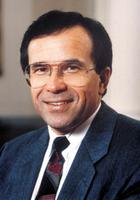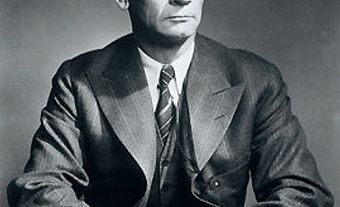
Filmon, Gary Albert
Gary Albert Filmon, engineer, businessman, premier of Manitoba (b at Winnipeg, Man 24 Aug 1942). After graduating from U of Manitoba (BSc 1964, MSc 1967), Filmon worked as a design engineer at Underwood McLellan & Assoc in Winnipeg 1964-69 and was vice-president and president of Success Business College in Winnipeg 1969-80. After serving on Winnipeg city council 1975-79, he was elected to the Manitoba legislature as a Conservative in 1979 and has been re-elected continuously since. He entered the Cabinet in Jan 1981 as minister of consumer and corporate affairs and environment with additional responsibilities and served until the government fell in Nov.
In 1983 Filmon succeeded Sterling LYON as Conservative leader and on 9 May 1988 formed a minority government after defeating the incumbent New Democrats.
With only 25 of the 57 seats in the legislature, Filmon faced a difficult task dealing with the ratification of the MEECH LAKE ACCORD, which he had inherited from his NDP predecessor, Howard PAWLEY (seeMEECH LAKE ACCORD: DOCUMENT). The Liberal opposition vigorously opposed the accord, and Filmon suspended the initial attempt at ratification in Dec 1988 to protest the Québec government's invocation of the "Notwithstanding" clause in the Constitution to override the Supreme Court's decision, striking down that province's controversial language legislation. In June 1990 after a last-minute first ministers meeting, and on the eve of the ratification deadline, passage of the accord was thwarted when Elijah HARPER, a native NDP MLA, refused to give the required unanimous consent and Filmon refused to bend the legislative rules to avoid the blockade.
Filmon was re-elected with a slim majority in Sept 1990 and quickly began an austerity program, increasing taxes and cutting government jobs and services. In the next round of constitutional negotiations, he became a determined advocate of a "Triple E"SENATE. Filmon was seen as one of the moderating influences during the negotiations and his role as a peacemaker was a significant factor in the achievement of a consensus for the CHARLOTTETOWN ACCORD, which was nevertheless rejected in his own province during the 1992 Referendum (seeCHARLOTTETOWN ACCORD: DOCUMENT). His success in the area of spending control led to a second majority government following the general election of Apr 1995.
Filmon and his party were embroiled in controversy following the 1995 election. The Conservatives had been accused of attempting to split the Conservative vote by running Aboriginal candidates in areas with high numbers of Aboriginal voters, a story that ultimately surfaced in 1998. Several of Filmon's staff were implicated, though Filmon himself was not. The scandal and increasing unemployment despite his promise of tax cuts and reinvestment in both health and education simply increased public's skepticism of Conservative promises, and the party lost to Gary DOER's NDP on 5 Oct 1999. Filmon resigned as leader in 2000.
Following his political career Filmon became a highly-respected business consultant and a member of many provincial and national boards and organizations. In 2009 he was made an Officer of the ORDER OF CANADA.

 Share on Facebook
Share on Facebook Share on X
Share on X Share by Email
Share by Email Share on Google Classroom
Share on Google Classroom

